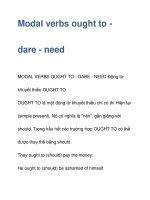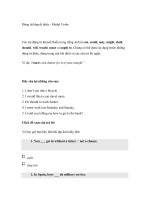modal verbs
Bạn đang xem bản rút gọn của tài liệu. Xem và tải ngay bản đầy đủ của tài liệu tại đây (160.74 KB, 8 trang )
<span class='text_page_counter'>(1)</span>Modal verbs.
<span class='text_page_counter'>(2)</span> Content 1. 2. 3. 4. 5. 6.. Can – could May – might Must – have to Shall – should Will – would Ought to – dare – need.
<span class='text_page_counter'>(3)</span> 1. Can - could Can. Could - Present ability - Past ability Eg: I can speak Eg: I could write when I was 5. - Used in conditional sentences English very well. - With sense verbs : Eg: If you tried, you could do = present continuous that work. - More polite than “ Can” to tense. Eg: Listen! I can hear ask the sound of the sea. Eg: Could you tell me the time, please? - Show a slight protest or doubt Eg: His story could be true, but I hardly think it is..
<span class='text_page_counter'>(4)</span> 2. May - might May Might - Show permission, ask permission, possibility Eg: It may/ might be rain. - Used after “ hope”, “ trust” Eg: I trust (hope) that you may find this plan to your satisfaction. - Used in adverb clause of concession. Eg: He may be poor, but he is honest. (Though he is poor…) - Used in petulant reproaches Eg: You might listen when I am talking to you..
<span class='text_page_counter'>(5)</span> Must – have to Must - A logical conclusion, a reasonable thought Eg: you have worked all day; you must be tired. - Some personal circumstances makes the obligation necessary. Eg: I must go to bed early. - NOT used in past tenses, in questions. - 'mustn't' to express strong obligations NOT to do something Eg: You mustn't phone me at work. We aren't allowed personal calls.. Have to - All tenses. - External circumstances Eg: I have to arrive at work at 9 sharp. My boss is very strict.. - “ don’t have to” = NO obligation or necessity. Eg: We don't have to get there on time. The boss is away today..
<span class='text_page_counter'>(6)</span> Shall- should Shall - Future tense: with “ I, we” - Suggestions or invitations Eg: Shall we go to cinema? Shall I help you with that?. Should - Used as an advice. = ought to Eg: You should send an email. - Regret something in the past. Eg: you should have studied hard. ( you fail in the exam because you didn’t study).
<span class='text_page_counter'>(7)</span> Will – would Will - Future tense: a plan, willingness, promise or determination. - In conditional sentence 1. - Requests : Eg: will you open the door, please?. Would - Past habits = used to Eg: I would go to the zoo when I was young. - In conditional sentence 2, 3 - Offers or requests: > polite than will.
<span class='text_page_counter'>(8)</span> Ought to – dare – need Ought to. Dare. Need. - = should - Strong probability - Ought not to have + p2: disagree with what had done. Eg: you ought not to have slept late last night.. - Mostly in interrogative and negative sentences. - Means: to have the courage to do sth Eg: She dare not tell the truth. NOTE: + “ I dare say” = I expect/ suppose/ think” Eg: I dare say he will come late. + “ How dare + S+ do sth = how can S be so rude and bold. Eg: how dare he speak to you like that?. - Mostly used in negative and interrogative sentences. - Means: necessary. Eg: you needn’t wait for me. I’ll come in a hour..
<span class='text_page_counter'>(9)</span>









